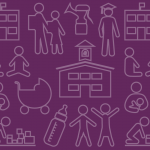Shortages of behavioral health care providers are contributing to a deepening mental health crisis among US children and adolescents. These workforce shortages most acutely affect children who live in rural areas and children who identify as Black, Indigenous, or otherwise as people of color (BIPOC). Moreover, disproportionate health and economic impacts of the COVID-19 pandemic have exacerbated their challenges in accessing effective, culturally responsive care.
To support children’s access to mental health care, we’ve partnered with the Centers for Disease Control and Prevention and the Milken Institute School of Public Health at the George Washington University to release three new publications for state legislators, state licensing board members, and changemakers working to improve health for children and families.
Our new resources identify policy levers and options that states could use to increase the supply of master’s-level providers — Licensed Clinical Social Workers (LCSWs), Licensed Marriage and Family Therapists (LMFTs), and Licensed Professional Counselors (LPCs). These publications highlight promising strategies to expand and support the behavioral health workforce through state licensure systems, Medicaid, and the Children’s Health Insurance Program (CHIP).
4/10/24
